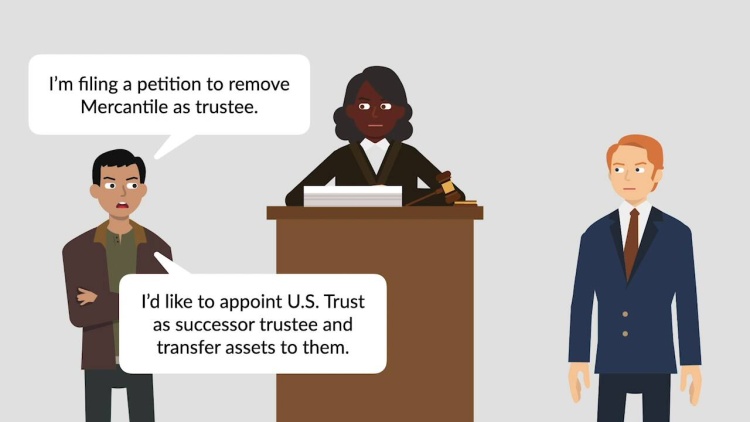Davis v. U.S. Bank National Association
Missouri Court of Appeals
243 S.W.3d 425 (2007)

- Written by Christine Raino, JD
Facts
Lorenz K. Ayers executed a trust under which his grandson, Harold A. Davis (plaintiff), was the life-income beneficiary and after Davis’s death, the trust assets were to be distributed to Davis’s children. In the event that Davis’s children did not survive him, the assets would go to his heirs-at-law, and if no heirs survived him, to Lafayette College. The trust appointed Mercantile Trust Company, National Association (Mercantile) (defendant) as trustee. Davis filed a petition on behalf of himself and his two children, Dillon and Marguerite, to remove Mercantile as trustee, appoint U.S. Trust Company of Delaware (UST) as successor trustee, and transfer the trust assets to UST. Davis argued that all of the statutory requirements for removal of a trustee without wrongdoing were met. First, all qualified beneficiaries were seeking removal of the trustee. Second, UST was a suitable successor trustee. Third, removal of Mercantile was not inconsistent with a material purpose of the trust. Fourth, removal of Mercantile best served the interests of the beneficiaries for the following reasons: (1) UST’s fee was 23.94 percent lower than Mercantile’s fee, as shown by the affidavits of an investment advisor and a bank officer and UST’s published fee schedule; (2) UST was more conveniently located, within a 30-minute drive of Davis; (3) UST was located in Davis’s state of domicile, unlike Mercantile, and the change in domicile would avoid out-of-state income tax on the trust assets; and (4) UST understood Davis’s financial situation and was willing to work with an independent investment coordinator. The circuit court granted Davis’s motion for summary judgment, ordered removal of Mercantile, and appointed UST as successor trustee. Mercantile appealed, asserting, inter alia, that Davis failed to join necessary parties, that Davis had a conflict of interest in representing his children, that issues of fact remained regarding UST’s reduced fee, that changing the trustee was inconsistent with a material purpose of the trust, and that discovery was needed before summary judgment could be granted.
Rule of Law
Issue
Holding and Reasoning (Sullivan, J.)
What to do next…
Here's why 907,000 law students have relied on our case briefs:
- Written by law professors and practitioners, not other law students. 47,100 briefs, keyed to 996 casebooks. Top-notch customer support.
- The right amount of information, includes the facts, issues, rule of law, holding and reasoning, and any concurrences and dissents.
- Access in your classes, works on your mobile and tablet. Massive library of related video lessons and high quality multiple-choice questions.
- Easy to use, uniform format for every case brief. Written in plain English, not in legalese. Our briefs summarize and simplify; they don’t just repeat the court’s language.





